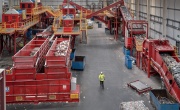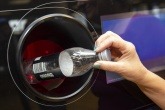Four in five Scots back DRS despite industry and local authority concerns

Concerns have been raised by local authorities and within industry, however, that the scheme will have an adverse effect on kerbside recycling and won’t necessarily reduce the amount of single-use plastic purchased.
77 per cent of people surveyed support the introduction of the Scottish Government’s proposed ‘all-in’ DRS model, where a 20p deposit will be added to the price of all single-use drinks containers made from PET plastic, aluminium and steel, and glass between 50 millilitres and three litres in size, which can then be recouped on return of the empty container.
Of those that support the scheme, 72 per cent say that helping the environment is one of their top motivations for supporting the scheme, while 70 per cent said that reducing litter in Scotland was a primary concern for them.
The DRS, set to be introduced in 2021, will allow people to take their empty bottles and cans to a wide range of accessible return points – anywhere that sells takeaway drinks, from supermarkets and newsagents to many cafes and takeaways.
Commenting on the results of the survey, Zero Waste Scotland’s Chief Executive Iain Gulland said: “Scotland’s Deposit Return Scheme will make it easy for people to do something good for the environment.
“People in Scotland are more environmentally aware than ever before but it can be hard to know how to respond to something as monumental as the climate emergency at an individual level. This scheme will give them an action they can do week in and week out to help cut Scotland’s carbon footprint.
“By taking back your empty bottle or can, you won’t just get your 20p back. You’ll also be reducing the amount of raw materials that are used to make bottles and cans. That means you’ll be playing a part in Scotland’s response to the climate emergency every single time you take your bottle or can back to be recycled.”
‘All-in’ versus ‘on-the-go’
Despite public support, there are concerns from industry and local authorities that a DRS will have a detrimental effect on existing kerbside recycling and inadvertently increase the circulation of single-use plastic.
British Glass, the trade body for the UK glass industry, says that glass should not be included in the scheme as it will have a negative impact on current kerbside recycling and the use of two different recycling systems may lead to consumer confusion. British Glass also asserts that the inclusion of glass will also increase the total cost of the DRS by tens of millions of pounds per year.
In addition to this, there is the concern that inflated costs within the glass industry will lead to retailers and manufacturers choosing cheaper plastic containers over glass, therefore increasing the amount of plastic in circulation.
Despite this industry opposition, it would seem that consumers support it – the same YouGov poll revealed that 85 per cent of Scottish respondents thought that glass ‘definitely should’ or ‘probably should’ be included in Scotland’s DRS.
Meanwhile, local authorities have long made their feelings clear on a DRS. At a recent evidence session as part of the UK Parliament’s Housing, Communities and Local Government Committee’s inquiry into the UK Government’s Resources and Waste Strategy, which includes proposals for a DRS, Dan Roberts, Vice Chair of the Local Authority Recycling Advisory Committee (LARAC), said that an ‘all-in’ DRS would “cannibalise” kerbside recycling collection systems, diverting valuable recyclable material away from these systems.
The containers that would be targeted by an ‘all-in’ DRS are already captured by kerbside recycling systems, as noted by Lee Marshall, LARAC CEO: “If four in five people all used their kerbside schemes for all their material then the recycling rate would be a lot higher.”
Despite its standing opposition to a DRS, LARAC has expressed a preference for an ‘on-the-go’ DRS, if there is to be one at all, that would only focus on containers that are not generally captured by household recycling, such as disposable coffee cups and bottles and containers smaller than 750ml and sold only in single units. LARAC has stated that on-the-go items are the main litter problem, so targeting these containers within a DRS, rather than adhering to the ‘all-in’ method, would “have less duplication with the existing kerbside schemes”.









